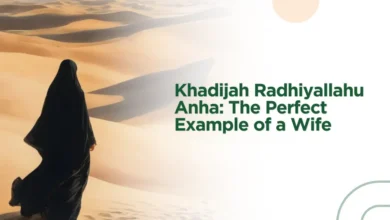The Essence of the Dua Rabbi Zidni Ilma Warzuqni Fahma: The Importance of Knowledge
The dua “رَبِّ زِدْنِي عِلْمًا,” meaning “My Lord, increase me in knowledge”, is a significant supplication in Islam. It appears in Surah Taha, verse 114:
فَتَعَالَى اللَّهُ الْمَلِكُ الْحَقُّ ۗ وَلَا تَعْجَلْ بِالْقُرْآنِ مِن قَبْلِ أَن يُقْضَىٰ إِلَيْكَ وَحْيُهُ ۖ وَقُل رَّبِّ زِدْنِي عِلْمًا
“So exalted is Allah, the True King. Do not hasten with [recitation of] the Qur’an before its revelation is completed to you, and say, ‘My Lord, increase me in knowledge’.” (Q.S. Taha: 114)
This verse highlights the importance of seeking knowledge, especially divine wisdom, which guides believers to a deeper understanding of life, both spiritually and intellectually. The dua encourages continuous learning, reflecting the essence of Islam, which values knowledge as a path toward righteousness and understanding of Allah’s creation.
Deeper Meaning of the Dua
The phrase “رَبِّ زِدْنِي عِلْمًا” can be broken down into its three key components:
- رَبِّ (Rabbi), meaning “My Lord,” a direct appeal to Allah Ta’ala as the ultimate source of all knowledge and wisdom.
- زِدْنِي (Zidni), meaning “increase me,” which implies a desire for constant growth and improvement.
- عِلْمًا (Ilma), meaning “knowledge,” which encompasses both spiritual knowledge (of Allah and His guidance) and worldly knowledge beneficial for human development.
An extended version of the dua is “رَبِّ زِدْنِي عِلْمًا وَارْزُقْنِي فَهْمًا,” which translates to “My Lord, increase me in knowledge and grant me understanding.” This addition emphasizes not only the acquisition of knowledge but also the comprehension necessary to apply it wisely in all aspects of life.
Also read:It’s Never Too Late to Learn Islamic Knowledge
The Importance of Knowledge in Islam
Islam places great emphasis on the pursuit of knowledge. The Prophet Muhammad (shallallahu alaihi wa sallam) highlighted its significance in the hadith:
“طَلَبُ الْعِلْمِ فَرِيضَةٌ عَلَى كُلِّ مُسْلِمٍ”
“Seeking knowledge is obligatory for every Muslim.” (HR. Ibnu Majah)
This hadith underscores the universal obligation for every Muslim to seek beneficial knowledge, whether it is related to religious or worldly matters. Knowledge is the foundation of a well-rounded Muslim life and is vital for personal development, improving one’s relationship with Allah Ta’ala, and contributing to society.
Furthermore, in another hadith, the Prophet shallallahu alaihi wa sallam mentioned:
“مَنْ سَلَكَ طَرِيقًا يَلْتَمِسُ فِيهِ عِلْمًا سَهَّلَ اللَّهُ لَهُ طَرِيقًا إِلَى الْجَنَّةِ”
“Whoever treads a path in search of knowledge, Allah will make easy for him a path to Paradise.” (HR. Muslim)
This statement reveals the profound spiritual rewards attached to seeking knowledge, as the pursuit of learning is linked to attaining Paradise. Knowledge, particularly of Islamic teachings, leads to better decision-making, piety, and improved behavior, ultimately drawing a person closer to Allah.
Also read:The Power of Knowledge: Achieving Success in This World and the Hereafter
Benefits of Reciting the Dua
Reciting the dua “رَبِّ زِدْنِي عِلْمًا” offers numerous benefits, including:
- Increase in Knowledge: The most apparent benefit is an increase in both religious and worldly knowledge, as knowledge is seen as a continuous journey.
- Wisdom and Insight: By seeking understanding (فَهْمًا), the dua ensures that the knowledge gained is applied effectively and wisely in various aspects of life.
- Spiritual Growth: Knowledge of Allah’s creation and His commandments strengthens one’s faith, and by seeking more knowledge, one deepens their connection with Allah Ta’ala.
- Personal and Academic Success: Students and scholars often recite this dua to improve their studies, memory, and comprehension. It serves as a spiritual tool to help overcome difficulties in learning.
- Humility: The act of asking Allah Ta’ala for more knowledge is an acknowledgment of one’s limitations and a reminder to remain humble despite one’s achievements.
- Guidance and Success: The dua aligns one with Allah’s guidance, ensuring that the knowledge gained is used for righteous purposes, ultimately leading to success in both worldly and spiritual matters.
Practical Application in Daily Life
The dua “رَبِّ زِدْنِي عِلْمًا” can be incorporated into daily routines to encourage consistent personal growth and spiritual development. It can be recited during prayer, before studying, or when seeking clarity in challenging situations. Parents can teach this dua to their children, instilling the value of knowledge from an early age.
Additionally, regular recitation of this dua fosters a mindset of lifelong learning. As modern life presents endless opportunities for learning, Muslims are encouraged to seek knowledge in various fields while maintaining a deep connection with their faith.
Also read:Faith, Knowledge, and Deeds: The Three Foundations of Act in Islam
Conclusion
In conclusion, knowledge holds a vital place in Islam, as it is the foundation for personal and spiritual growth. The dua “رَبِّ زِدْنِي عِلْمًا” is not merely a request for more knowledge but a reflection of a Muslim’s humility and recognition of Allah Ta’ala as the ultimate source of wisdom. Through continuous learning and seeking divine guidance, Muslims can navigate life’s complexities and contribute positively to their communities. Whether in academics, personal development, or religious understanding, this dua serves as a constant reminder of the importance of knowledge in every aspect of life.

References:
- Evermos. (n.d.). Robbi Zidni Ilma Warzuqni Fahma Artinya. Retrieved from https://evermos.com/home/panduan/islami/robbi-zidni-ilma-warzuqni-fahma-artinya/
- Iman Updates. (n.d.). Rabbi Zidni Ilma Meaning, Arabic Text, Ayat & Benefits. Retrieved from https://imanupdates.com/rabbi-zidni-ilma/
- My Islam. (n.d.). Rabbi Zidni Ilma Dua Meaning. Retrieved from https://myislam.org/rabbi-zidni-ilma/
- Islamtics. (n.d.). Rabbi Zidni Ilma Full Dua Meaning, in Arabic, Pronunciation & 3 Benefits. Retrieved from https://islamtics.com/rabbi-zidni-ilma-dua-meaning/
- Prayer Islam. (n.d.). Rabbi Zidni Ilma: A Comprehensive Guide. Retrieved from https://prayerislam.com/rabbi-zidni-ilma/
- Rumaysho. (n.d.). Maksud Doa Rabbi Zidni Ilma: Tambahkan Aku Ilmu. Retrieved from https://rumaysho.com/13158-maksud-doa-rabbi-zidni-ilma-tambahkan-aku-ilmu.html







